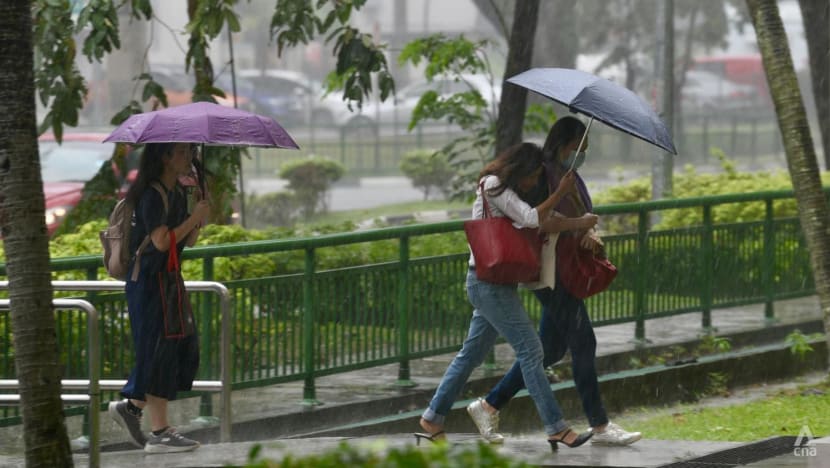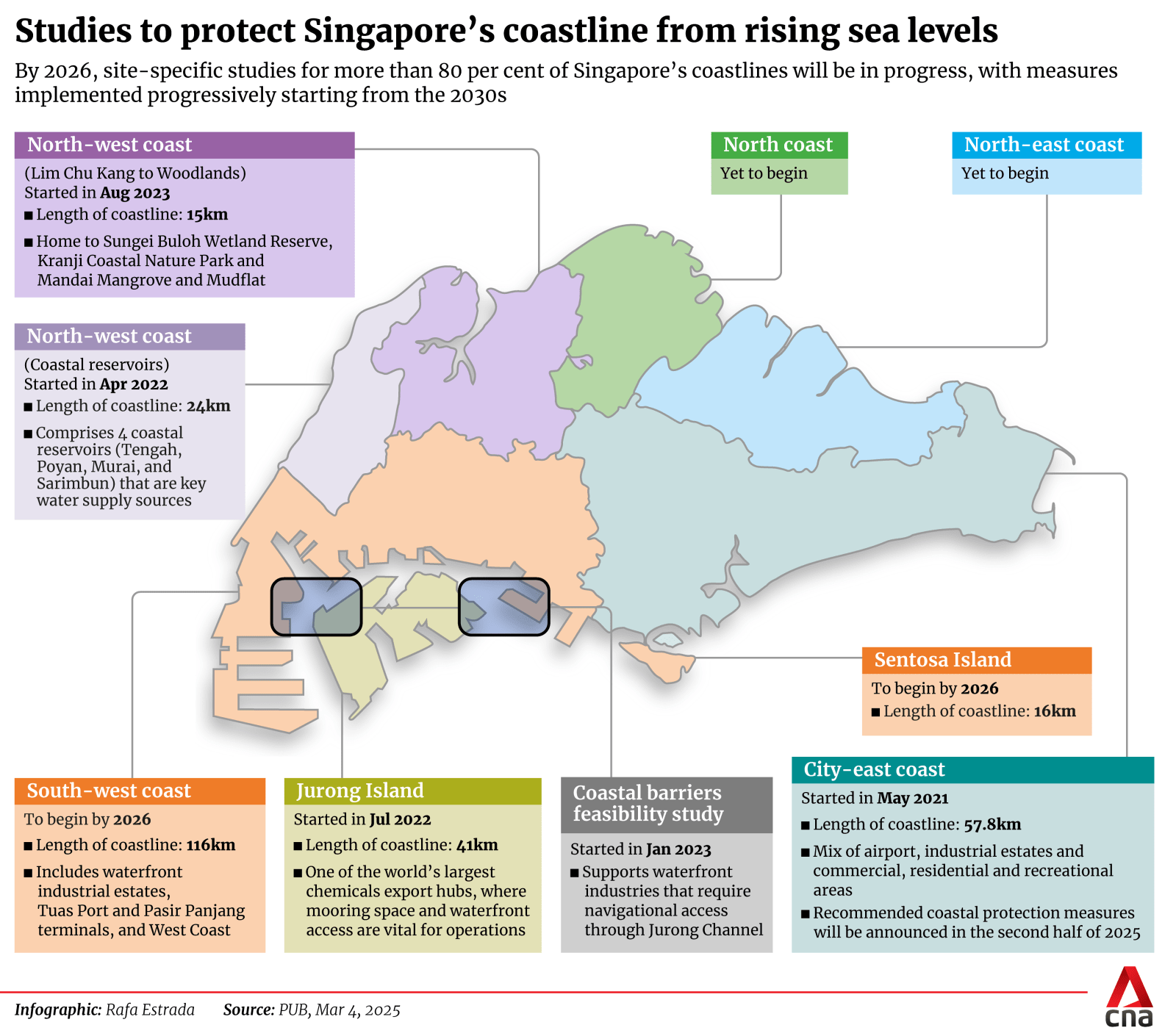Singapore launches S$25 million research programme to predict extreme weather
The Weather Science Research Programme will develop advanced weather prediction systems which could improve Singapore's ability to forecast phenomena like Sumatra squalls.

People walk in heavy rain in Singapore on Mar 3, 2023. (File photo: CNA/Jeremy Long)

This audio is generated by an AI tool.
SINGAPORE: Singapore has launched a S$25 million (US$18.5 million) research programme to better understand and improve its ability to predict extreme weather events, including Sumatra squalls and other climate-related phenomena.
Announced by the Ministry of Sustainability and the Environment (MSE) on Tuesday (Mar 4), the Weather Science Research Programme aims to advance weather prediction capabilities in Singapore's tropical urban environment.
The initiative is funded under the Research, Innovation and Enterprise (RIE) 2025 plan and is open for proposals from local research institutions, with projects expected to be awarded in the second half of 2025.
RIE2025 builds on past plans in 2015 and 2020 to tackle a broader spectrum of national needs, improve Singapore's scientific capabilities and strengthen support for companies and establish new technology translation platforms.
The government has allocated S$25 billion - or about 1 per cent of Singapore's GDP - for the RIE2025 plan for the period of 2021 to 2025.
Climate change poses significant challenges for Singapore and the wider Southeast Asian region, MSE said on Tuesday. The third national climate change study released in January last year projected rising temperatures for Singapore, more extreme wet and dry periods, and increasing sea levels by the end of the century.
In September last year, a Sumatra squall brought strong winds and heavy rain to Singapore, toppling trees, causing traffic disruptions and damaging property. This prompted authorities to issue an advisory urging employers to prepare for erratic and sudden weather changes.
"Singapore is located in the deep tropics where weather prediction is particularly challenging, due to the complexity of dominant local weather processes like thunderstorms and fine-scale interactions with local features such as coasts and the urban landscape," said MSE.
AI-DRIVEN WEATHER PREDICTION
The new research programme will strengthen Singapore's weather science capabilities by leveraging artificial intelligence and other advanced technologies.
The Centre for Climate Research Singapore, which comes under the national meteorological agency, will work with institutes of higher learning and research organisations to enhance weather prediction models, incorporating the latest scientific advancements.
One key focus is the use of AI to integrate data from multiple sources, improving forecasts for heavy rainfall and strong winds. Researchers will also develop advanced weather prediction systems that account for interactions between ocean, land and atmospheric conditions.
These improvements aim to improve Singapore's ability to forecast phenomena like Sumatra squalls, said a media release issued by MSE and Meteorological Service Singapore.
A major initiative under the programme will be the creation of a detailed historical weather reanalysis for recent decades in Southeast Asia – the first of its kind in the region. The data will offer valuable insights into past weather trends and enhance AI-driven forecasting techniques, the agencies added.
COASTAL STUDIES IN SENTOSA, SOUTH-WEST SINGAPORE
To address rising sea levels, the ministry announced plans to ramp up coastal protection measures, including two new site-specific studies for Sentosa and Singapore's south-west coast.
The third national climate change study projected that mean sea levels around Singapore could rise by up to 1.15m by 2100 and up to 2m by 2150.
"With around 30 per cent of our land less than 5m above mean sea level, Singapore is vulnerable to the impact of sea level rise," MSE said.
Some locations such as East Coast Park already experience "sporadic" episodes of coastal flooding when high tide coincides with heavy rainfall, it added.
Prime Minister Lawrence Wong announced during his Budget speech on Feb 18 that another S$5 billion will be injected into the Coastal and Flood Protection Fund. This adds on to the initial injection of S$5 billion when the fund was first announced in 2020 to protect Singapore against rising sea levels and enhance flood resilience.
The two new site studies will start by 2026. The Sentosa study will cover about 16km of the coastline and take into account the island's role as a leisure and tourism destination, MSE said. It will be led by Sentosa Development Corp and integrated with its future development plans.
The south-west coast study will span about 116km from Tuas to Pasir Panjang, covering industrial and port areas such as Tuas Port and Pasir Panjang terminals, as well as recreational spaces like West Coast Park. MSE said it will study how to align coastal protection measures with the area's development plans.
Since 2021, PUB and other government agencies have embarked on site-specific studies for the city-east coast, north-west coast and Jurong Island to assess coastal vulnerabilities.
Details on the coastal protection plans for the Greater Southern Waterfront and Changi – part of the city-east coast study – are expected to be unveiled in the second half of this year.
In response to CNA's queries, the director of PUB's Coastal Protection Department Hazel Khoo said the coastal protection measures will be progressively implemented from the 2030s.
This implementation will stretch over a few decades, starting with measures at the city-east coast, which includes "Long Island".
Minister for Sustainability and the Environment Grace Fu said that funds for these measures will come from the annual Budget, the Coastal and Flood Protection Fund, and through borrowing.
"Where eligible, such as for land reclamation costs, we will also use the past reserves," she told parliament on Tuesday.
"We will continue to study how best to finance these measures in a way that is fiscally sustainable and equitable across generations."

NEW COASTAL PROTECTION LEGISLATION
To support the implementation of coastal protection plans, MSE and PUB will introduce the Coastal Protection Bill in the second half of this year.
The legislation will outline stakeholder responsibilities, safeguard land for coastal protection measures and enforce compliance with coastal protection standards.
PUB also plans to launch a code of practice for coastal protection by the first half of 2026 to provide a set of standards for the industry on the design, construction and operation of various coastal protection structures in Singapore - similar to what it has for surface water drainage.
To complement this, a flood-resilient developments guidebook will be developed, with case studies and guidelines for landowners to enhance their properties' flood resilience.
MSE will also progressively roll out infrastructural interventions to build Singapore's resilience to rising temperatures, said Ms Fu.
Cool coatings will be applied to all existing Housing and Development Board estates across Singapore by 2030.
The ministry is studying the effectiveness of cool coatings to other infrastructure archetypes, such as schools and hawker centres, Ms Fu added.




















